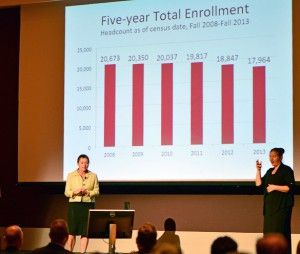Retention, recruitment among topics during address

September 9, 2013
As the university experiences its lowest enrollment in more than 40 years while simultaneously experiencing the highest freshman enrollment since 2005, retention was a focus of Chancellor Rita Cheng’s State of the University Address Monday.
Cheng said the university specifically selected students who are well prepared for college and is working to fix the financial aid system, which saw an average debt of $6,500 in Fall 2013 for students who leave the university. Bursar holds have also nearly doubled in recent years, she said.
Advertisement
“We did not try to artificially see higher enrollment of students who were not historically retained,” Cheng said. “We also are committed to a financial aid and scholarship model that supports students who wish to stay at SIU.”
And while the nearly 13 percent increase in freshmen was not enough to offset the drop in enrollment elsewhere, Cheng said there is hope on the horizon.
“As the 2010 class graduates and another strong freshman class enters next fall, we’ll start to see improvements in our overall enrollment figures,” she said.
To push building a strong freshman class, Cheng said the university has expanded recruitment efforts by mailing more than 1.6 million printed pieces during the last recruiting cycle.
“Often, SIU was the first university these students heard from, making us stand out in the crowded marketplace,” she said.
Cheng also labeled University College 101 courses as critical to improving retention. Starting last year, freshmen were required to enroll in math courses at some point during their first year; she said the requirement helped student success rates in math courses increase by 21 percent.
Cheng also explained the university’s fiscal year 2014 budget and how changes have been made because of outside influences. The state did not decrease the budget from fiscal year 2013, a positive because the state told the university to expect a 5 percent drop, she said. State appropriations provide 47 percent of funds for academic programs, while tuition funds the other 53 percent.
Advertisement*
Looking to the future, President Barack Obama’s plan to provide financial aid based on university performance in key areas like retention and time-to-degree could affect the university down the road, Cheng said.
“It is unclear how the ratings will be applied and whether they will be harmful or helpful to SIU,” she said. “However, they serve as a reminder that as a national university, we work within a larger context.”
After speaking on retention, Cheng shifted to new academic programs and university departments soon to come to fruition. A new Center for Fermentation Science could help enhance relationships with the community and help build enrollment, she said.
“(The center) will also take advantage of the growing trend of Southern Illinois’ start-up vineyards, micro-breweries and distilleries,” she said.
Construction on campus buildings will allow additional space for existing programs, she said. Work on the sixth and seventh floors of Morris Library will be complete for the spring semester, and the Pulliam renovation for the School of Art and Design is 30 percent complete — the renovation is expected to be complete by fall 2014, Cheng said.
The university will also look to expand the Center for Inclusive Excellence by adding a Women’s Resource Center to address women’s issues and gender-related concerns, Cheng said.
The chancellor also took the time to recognize University staff; in particular she pointed out Department of Public Safety Director Todd Sigler, who will retire Oct. 15 after 30 years of service to the university.
“Todd started with the department as a member of the Saluki patrol in 1983 and became an officer in 1985,” Cheng said. “Todd, you’ll be missed.”
To wrap up her speech, Cheng noted that while improvements can still be made, the accomplishments of the last year are nothing to be taken lightly.
“We have much work to do, but we build on a solid foundation,” she said.
Advertisement







